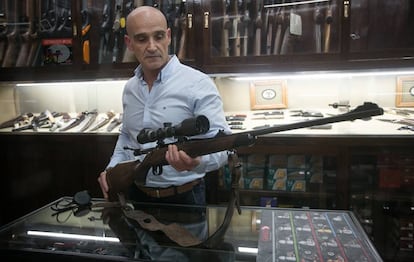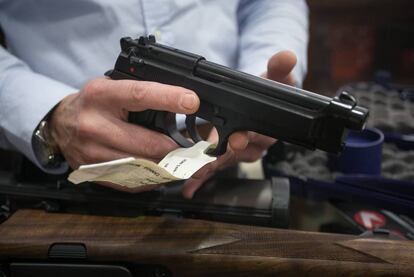Who are Spain’s gun owners?
Spaniards are not big weapons owners in global terms but a growing black market is cause for concern

Sitting on a terrace having breakfast, Fernando glances around, and then opens his jacket to reveal a small pistol in a brown leather holster. It is a Glock 9mm and he carries it for protection. A jeweler by trade, he was the target of a number of violent attacks several years ago, and was subsequently declared “at risk” and issued a B license by Spanish police – a license that allows him to carry a firearm for self-defense.
Fernando is not particularly pleased to be carrying this weapon. Not only is it heavy, it means he can’t relax, which rules out going for a drink or to a football match. It also serves as a constant reminder of the time he was attacked. But he does say it makes him feel safer. Fernando – not his real name – is one of almost 8,000 Spanish civilians licensed to carry a firearm for self-defense. Those applying must prove they are at real risk of attack. Most of these people are politicians, jewelers, gun-sellers, judges or magistrates, soccer players and former military personnel. The weapons they carry must be kept hidden at all times.
Some 8,000 Spanish civilians are authorized to carry a gun for self-defense after providing proof they are at risk
But Spain has another three million registered arms, belonging to 1.1 million civilians, most of whom have ostensibly bought their weapons for hunting, target shooting or as collector’s items.
An inventory revised by the Central Inspectorate for Arms and Explosives (ICAE) every month records each weapon and its owner’s location. The inventory shows Andalusia to be home to the most weapons, 611,987 – most of these are carbines – while Melilla has the least with 399. Proportionally, however, Extremadura, Castilla-La Mancha, Navarre and La Rioja overtake Andalusia, and, when it comes to self-defense, Madrid wins hands down because of the large concentration of people holding public office in the capital.
The ICAE inventory also includes other oddities such as the number of crossbows in Spain. This happens to be 1,647, with Andalusia accounting for most of them and Ceuta and Melilla being the only two autonomous regions where none are registered. Then there is information on areas with high quotas of guns purchased for target shooting, such as Asturias, where there are four weapons for every 1,000 inhabitants, and Catalonia: two for every 1,000.
Though Spain is the world’s seventh-biggest exporter of arms in the world, it has one of the most draconian legislative frameworks in the European Union with regard to personal possession. Consequently, when it comes to the number of registered guns per civilian it ranks a long way behind the United States and even the rest of Europe (where Finland, Germany and France are leaders). Globally, Spain ranks 61st out of 178 countries in terms of weapons per inhabitant, according to the Swiss-based Small Arms Survey.
With 2,000 members, the ANARMA association – Spain’s answer to America’s National Rifle Association – believes that the rules should be relaxed slightly to bring Spain into line with countries such as the Czech Republic where you can get a license for self defense by passing a test and presenting the corresponding certificates.
Some Spaniards who have been refused a B license end up buying a target-shooting pistol instead, which perhaps accounts for the fact there are 70,000 of these in Spain. They then drop by the range-shooting club regularly to get their documents stamped, verifying the weapons are for leisure use only.
ANARMA is convinced that the purchase of range-shooting pistols has soared because of the restrictions on B licenses while both the police and gun-sellers point out that using a range-shooting pistol for self-defense is legally problematic.

“Hardly anyone is issued with a B license,” says ANARMA president, Javier Arnaiz. “Its allocation is random. Sometimes we have put in applications for women suffering domestic abuse or for owners of high-risk businesses and have been turned down.” Arnaiz was also refused a B license, despite running a business he describes as “related to security.”
The mounting restrictions on civilian firearm possession within Europe are, in some people’s minds, a misguided response to the problem of a spiraling homicide rate and terrorist incidents. Five days after terrorists murdered 132 people in Paris in November 2015, the European Commission presented a proposal to reform gun control with, among other things, a general ban on the possession of semi-automatic weapons.
ANARMA and other similar associations throughout the EU were incensed by the proposed reforms since the ban would directly affect marksmen and hunters who use these weapons to kill big game. ANARMA went on to say that as many as 100,000 semi-automatic weapons would be confiscated in Spain if the proposals became law.
“Instead of focusing on the black market, which is where the terrorists get their weapons, they attack the legal weapons market,” says an ANARMA spokesperson.
Instead of focusing on the black market where terrorists get weapons, they are attacking the legal weapons market ANARMA spokesperson
One proposal prompted by the Paris attacks that has become law is the standardization of what constitutes a deactivated weapon among EU member states. The November 2015 attacks exposed a gaping legal loophole created by the inconsistent criteria used to define “deactivated” within the EU, leading these weapons to become a feature on the black market with strong links to terrorism.
The loophole allowed for the purchase of deactivated weapons as collector’s items in former war-torn countries, such as the former Soviet bloc, the Balkans and North Africa, where the late Colonel Qaddafi actively encouraged families to buy old Kalashnikovs. The weapons used in the Paris attacks had their origins in deactivated stocks from the Balkans while the weapons used in the Charlie Hebdo killings some months earlier were traced to a Slovakian dealer. Turning these deactivated guns back into lethal weapons is relatively easy and the legal definition of what constitutes such a weapon differs across countries within the EU. However, they can circulate freely within the common market.
The price of a deactivated war weapon is around €500 but once it has been reactivated, it can fetch between €2,000 and €2,500. Eastern Europe has been seen to be more industrious than most in this field but Spain is also involved in weapon reactivation. In April 2015, there was a raid on an establishment in Alicante specializing in reactivating weapons from Slovakia. Inside, police found 100 firearms, including AK-47 assault rifles, and sub-machine guns including VZ61s, VZ25s and Rak PM63s. They were sourced back to the same dealer who supplied weapons to terrorists involved in the January 2015 attacks in Paris and for the attack on a Thalys train that was traveling from Holland to France the same year.
The black market is currently flooded with deactivated weapons from countries such as Slovakia that can easily be reactivated.
Blank guns or the so-called starter pistols used in sports competitions and movies are similarly exploited. The only prerequisite in Spain for purchasing such a gun is proof of ID. But converting this “prop” into a lethal weapon is relatively simple.
This is a safe enough country and I don’t feel at all threatened Carlos López, gundealer
One of the most high-profile arrests related to this activity was that of the so-called North Korean ambassador to Spain, Cao de Benós, who was picked up by police after two starter pistols were sent to his home – a 9mm Zoraki 917 Black and a semi-automatic Zoraki 906. Both had been adapted to fire real bullets. And though ANARMA believes this practice to be risky and infrequent, Spanish police have confiscated around 500 adapted starter pistols in the last two years.
In the window of the Ravell gun shop in Diputación street in Barcelona, a few replicas of dangerous firearms are on show. The real weapons are kept under lock and key. The owner, Sara, handles a small Glock 9mm pistol that she has just taken out of the safe. This is a favorite backup weapon with the police. “They are starting to be our main clients,” she says. “The hunting tradition is disappearing. As far as B licenses go, there might be one issued a year.”
Both Sara and Carlos López – president of the Gun Guild and owner of the M. Roca gun-seller in Barcelona – are licensed to carry weapons. However, neither of them does. “This is a safe enough country and I don’t feel at all threatened,” says López, whose shop has only seen one violent incident in the 140 years it has been open for business.
English version by Heather Galloway.
Tu suscripción se está usando en otro dispositivo
¿Quieres añadir otro usuario a tu suscripción?
Si continúas leyendo en este dispositivo, no se podrá leer en el otro.
FlechaTu suscripción se está usando en otro dispositivo y solo puedes acceder a EL PAÍS desde un dispositivo a la vez.
Si quieres compartir tu cuenta, cambia tu suscripción a la modalidad Premium, así podrás añadir otro usuario. Cada uno accederá con su propia cuenta de email, lo que os permitirá personalizar vuestra experiencia en EL PAÍS.
¿Tienes una suscripción de empresa? Accede aquí para contratar más cuentas.
En el caso de no saber quién está usando tu cuenta, te recomendamos cambiar tu contraseña aquí.
Si decides continuar compartiendo tu cuenta, este mensaje se mostrará en tu dispositivo y en el de la otra persona que está usando tu cuenta de forma indefinida, afectando a tu experiencia de lectura. Puedes consultar aquí los términos y condiciones de la suscripción digital.









































